India locks down occupied Kashmir, former CMs put under house arrest
India deploys unprecedented number of troops, all internet and telephone services suspended in occupied valley
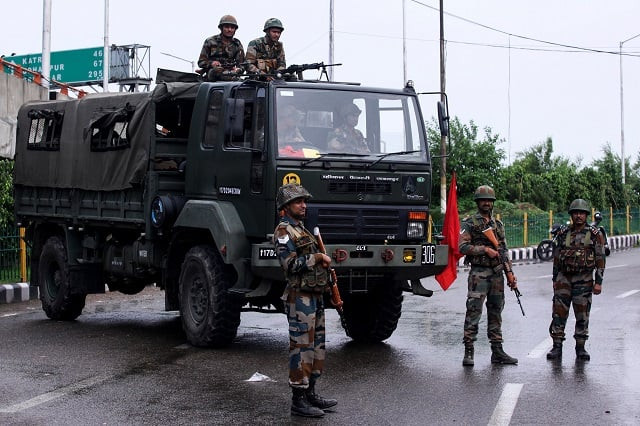
Indian security personnel stand guard on a street in occupied Jammu. -AFP
Communications were cut, with private mobile networks, internet services and telephone landlines cut.
Civil-military huddle reaffirms resolve to thwart any Indian misadventure
Before the network disruptions, senior former and current Kashmiri political leaders tweeted that they had been put under house arrest.
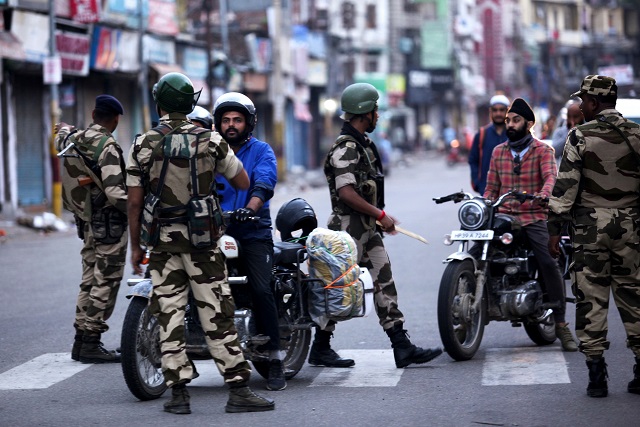 Indian security personnel question motorists on a street in occupied Jammu. -AFP
Indian security personnel question motorists on a street in occupied Jammu. -AFP"I believe I'm being placed under house arrest from midnight tonight & the process has already started for other mainstream leaders," Omar Abdullah, a former chief minister of IoK, tweeted before communications were cut.
To the people of Kashmir, we don’t know what is in store for us but I am a firm believer that what ever Almighty Allah has planned it is always for the better, we may not see it now but we must never doubt his ways. Good luck to everyone, stay safe & above all PLEASE STAY CALM.
— Omar Abdullah (@OmarAbdullah) August 4, 2019
Mehbooba Mufti, another regional leader and Modi’s former ally, said on Twitter it was “ironic that elected representatives like us who fought for peace are under house arrest. The world watches as people & their voices are being muzzled.”
Those who’re celebrating the situation here are ignorant about the far reaching consequences of any unilateral action that’ll taken by GOI.
— Mehbooba Mufti (@MehboobaMufti) August 4, 2019
"As per the order, there shall be no movement of public and all educational institutions shall also remain closed," Indian occupying forces stated in order for Srinagar and surrounding areas in a statement.
"There will be a complete bar on holding any kind of public meetings or rallies during the period of operation of this order."
Universities, schools and colleges in IoK were ordered to be shut, and one district in that region was placed under lockdown.
Several other major districts of the occupied valley were also placed under restrictions, local media reported.
Growing panic among residents
The latest tensions started in the last 10 days after New Delhi deployed at least 10,000 troops. A further 70,000 had been deployed, which is believed to be an unprecedented level.
India has introduced other security measures over terror threat claims - including a call to stock up food and fuel.
The measures have sparked growing panic among residents, who formed long queues outside petrol stations, food stores and cash machines.
PM demands UNSC action against India for using cluster munitions along LoC
A heavy presence of troops was seen in parts of Srinagar as gunshots sounded, although the streets remained empty, said local residents.
In downtown Srinagar, occupying forces threw "chili bombs" that affect respiratory systems onto the deserted streets, a local resident said, while an official said nearly 300 administrative officials and top security officials had been issued with satellite phones.
The last time similar restrictions were imposed in occupied Kashmir was in 2016 after the killing of a freedom fighter Burhan Wani, which sparked months of street protests that left nearly 100 dead.
Local authorities claimed it had intelligence about militant attacks and called off a major Hindu pilgrimage, asking pilgrims and tourists to return home.
Threat to scrap IoK’s special status
While India has highlighted the security risk, Kashmiri and opposition politicians in New Delhi are concerned the extra troops were deployed for other reasons.
Since mid-2018, IoK has been under Delhi's direct rule after Prime Minister Narendra Modi's Bharatiya Janata Party (BJP) withdrew support for its local partner and dissolved the local government.
There are fears Modi's Hindu nationalist government could carry out a threat to scrap the region's special status under the constitution.
Broader Tensions
Kashmir has long been a bone of contention between Pakistan and India. India accuses Pakistan of funding militants in IoK while Islamabad denies the Indian accusation, saying it provides only diplomatic and moral support to freedom fighters.
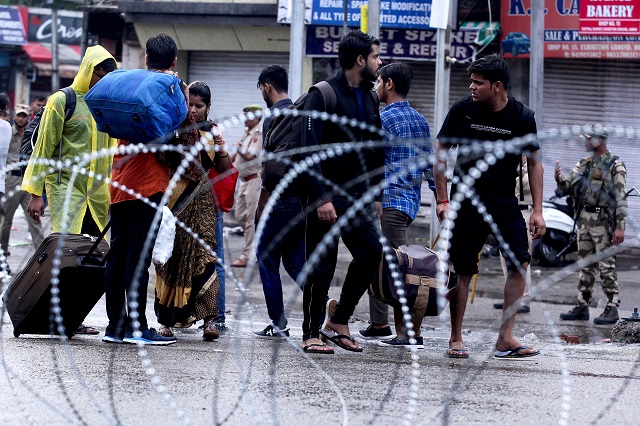 People make their way along a street in occupied Jammu. -AFP
People make their way along a street in occupied Jammu. -AFPIndia used illegal cluster bombs recently, killing and injuring civilians in the disputed Kashmir region. India denied it had used such weapons.
In July, Trump told reporters that Modi had asked him if he would like to be a mediator on Kashmir. India denied again Modi ever asked for any mediation.
President Trump offered to mediate on Kashmir. This is the time to do so as situation deteriorates there and along the LOC with new aggressive actions being taken by Indian occupation forces. This has the potential to blow up into a regional crisis.
— Imran Khan (@ImranKhanPTI) August 4, 2019
India has long rejected any suggestion of third-party involvement and said it would deal with Pakistan only bilaterally.
The United Nations has appealed to the neighbours to exercise maximum restraint amid escalating tensions between the two countries along the Kashmir border.

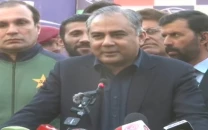




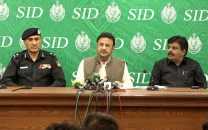












COMMENTS
Comments are moderated and generally will be posted if they are on-topic and not abusive.
For more information, please see our Comments FAQ